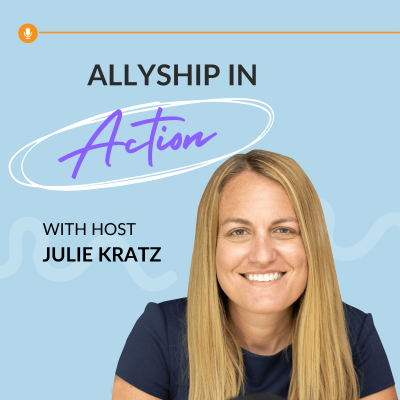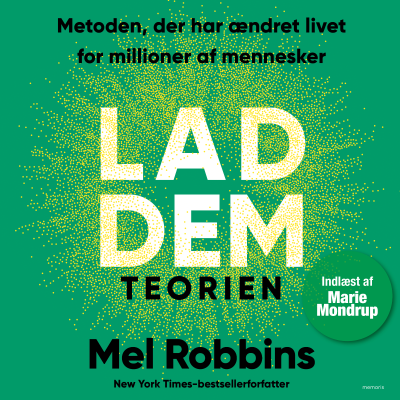
Allyship in Action
engelsk
Business
Begrænset tilbud
2 måneder kun 19 kr.
Derefter 99 kr. / månedOpsig når som helst.
- 20 lydbogstimer pr. måned
- Podcasts kun på Podimo
- Gratis podcasts
Læs mere Allyship in Action
Allyship doesn't happen by accident. It requires intention, action, and consistency. The goal of Allyship in Action is to provide practical, actionable tools from inclusion experts that people can be more actionable allies at work.
Alle episoder
346 episoder331: How to Nurture Workplace Culture as a Living Ecosystem with Abi Adamson
In this episode, Julie Kratz discusses global workplace culture strategies with Abi Adamson, founder of the Culture Partnership and a LinkedIn Top Voice. Abi introduces her "SERN" framework—Soil, Exposure, Roots, and Nutrients—as a way for leaders to move beyond performative DE&I and begin gardening their organizations for sustainable growth. Three Key Takeaways Cultivate Your Culture Like a Living Ecosystem. Instead of treating culture like a static construction project with a fixed end date, leaders should act as gardeners who constantly tend to the environment. "Organizations still treat culture like a construction project instead of what it is. That is why I call workplace culture a living ecosystem." Build Psychological Safety to Uncover the Truth. A healthy culture requires an environment where employees can be honest with leadership about what isn't working without fear of retaliation. "When you're able to have an organization that's built on psychological safety... everything else will follow." Reframe Resistance as a Sign of Progress. Friction and pushback are natural responses to major social or organizational changes; history shows that these moments often precede a shift in the right direction. "History has always taught us: whenever big changes happen, there's always resistance... to get to a good place, you do need to go through a bit of a gauntlet." Follow Abi at https://www.abiadamson.com/
330: Beyond DEI, Fixing Workplace Fairness with the FAIR Framework with Lily Zheng
Lily Zheng is a no-nonsense DEI strategist and best-selling author of DEI Deconstructed and Fixing Fairness. They discuss the limitations of traditional Diversity, Equity, and Inclusion (DEI) initiatives and introduce Lily's FAIR framework: Fairness, Access, Inclusion, and Representation. Lily challenges the industry's reliance on "one-and-done" training and advocates for a 90/10 split—prioritizing system-level changes over individual interventions. This conversation is a masterclass for leaders who want to move beyond performative buzzwords to create workplaces that truly work for everyone. Key Takeaways * Evolving DEI to FAIR: Lily proposes replacing the broad, often misunderstood terms of DEI with the FAIR framework. This model focuses on whether everyone is set up for success, free from discrimination (Fairness), whether environments allow full participation (Access), if people feel respected and safe (Inclusion), and if employees truly trust their leaders (Representation). * The 90/10 Systems: First Approach: Real change happens when organizations spend 90% of their effort on changing systems (incentives, hiring processes, and transparency) and only 10% on individual training. Training alone rarely solves systemic issues and can often lead to the "Cobra Effect," where poorly designed incentives actually make problems worse. * Representation is About Trust, Not Tokens: True representation isn't just a "check-the-box" exercise of hiring diverse faces. It is achieved only when people from all social groups Memorable Quotes from Lily Zheng "Rebranding DEI as FAIR will not save us. But reimagining how we conceptualize and execute what we used to call DEI just might." "If you had $10,000 to invest... I'd invest maybe $100 into training. But everything else is going into creating that system, to creating the incentives, to creating the culture." "We have to stop [teaching people how to jump over gaps]... we got to point at the missing stair and go, 'Why is there no stair there? We have to put a stair there.'" Follow Lily Zheng at lilyzheng.co and get their book at https://www.lilyzheng.co/authorship
329: How to Use Validation to Revolutionize Your Relationships and Leadership Influence with Dr. Caroline Fleck
In this episode, I'm sitting down with the incredible Dr. Caroline Fleck, clinical psychologist and author of the transformative new book, Validation. We often talk about allyship as a series of seemingly small, intentional actions, and some of the most profound work happens in the small, everyday moments of how we see and hear one another. Dr. Fleck joins me to pull back the curtain on validation—a skill that is frequently misunderstood but serves as a fundamental prerequisite for belonging and true connection. We dive into her "Validation Ladder" and explore how these techniques can revolutionize not just our corporate cultures, but our personal relationships and how we show up for ourselves. 3 Key Takeaways from Our Conversation: * Validation is Not Agreement or Praise: One of the biggest hurdles to being a good ally is the fear that validating a perspective means you agree with it. Dr. Fleck clarifies that validation is about acknowledging the truth in someone's experience—showing them you're there, you get it, and you care—without needing to agree with their logic or offer a "good job." * The "Validation Ladder" Framework: Effective validation is a tiered process. It starts at base camp with mindfulness (being fully present), moves through understanding (equalizing and contextualizing why someone feels the way they do), and reaches the top at empathy (authentically emoting and taking supportive action). * The Power of Self-Validation: Especially for marginalized groups who have been conditioned to "cover" or minimize their feelings to fit in, practicing self-validation is an essential act of reclamation. Using these tools introspectively allows us to honor our own experiences as valid, which is the first step toward showing up as a confident, authentic leader. Follow Dr. Caroline Fleck and get her book at https://drcarolinefleck.com/.
328: How Equality Wins, the New Vision for Inclusion with David Glasgow and Kenji Yoshino
This week, I welcome David Glasgow and Kenji Yoshino, co-authors of the new book How Equality Wins: A New Vision for an Inclusive America. As leaders of the Meltzer Center for Diversity, Inclusion, and Belonging at NYU School of Law, David and Kenji discuss the legal and political landscape of Diversity, Equity, and Inclusion (DEI) following the 2023 Supreme Court decision on affirmative action. They provide a practical roadmap for leaders to advance equality while navigating legal risks and political backlash. My Key Takeaways * The "Three Ps" of Legal Risk: A DEI program is generally only legally risky if it involves a Preference for a Protected group about a Palpable benefit. If any one of these elements is missing—such as a program that removes bias for everyone rather than creating a preference—it is likely legally permissible. * Leveling vs. Lifting: While "lifting" strategies (like identity-based mentorship) are becoming more legally vulnerable, "leveling" strategies offer a safer and often more effective path. Leveling focuses on systemic changes, such as debiasing performance reviews and implementing objective hiring criteria, which benefit all employees while advancing equity. * The Importance of Supporting Dissent: Effective DEI work requires creating psychological safety where dissenting views can be heard. Suppressing disagreement leads to "preference falsification," where people appear to agree but harbor quiet resentment. Engaging with counter-arguments ultimately builds stronger, more resilient support for inclusion. Follow David and Kenji at https://www.law.nyu.edu/centers/belonging [https://www.law.nyu.edu/centers/belonging] and pre-order their new book at https://www.simonandschuster.com/books/How-Equality-Wins/Kenji-Yoshino/9781668216750 [https://www.simonandschuster.com/books/How-Equality-Wins/Kenji-Yoshino/9781668216750].
327: Leadership Lessons from the Pitch with Ciaran McArdle
In this episode, Ciaran McArdle, CEO of XL Sports World and author of The Soccer of Success, joins Julie Kratz to discuss how the principles of the "beautiful game" can be used to transform corporate leadership. McArdle shares three key strategies for high-performance leadership, drawing parallels between the soccer pitch and the professional workplace: 1. Tailored Leadership: Meet Team Members Where They Are Effective leadership requires a nuanced approach, much like a soccer captain managing a diverse squad. * Individualized Communication: McArdle notes that while one teammate may need direct, vocal feedback to improve performance, another might require a quieter, more supportive "arm around the shoulder". * Psychological Insight: Leaders must understand the unique psyche of each team member to determine the best way to motivate them and demand their best. 2. The "White Line" Concept: Establish Clear Boundaries In soccer, crossing the white line onto the pitch signifies a complete shift in intensity and mindset. * Performance Intensity: While on the "field" (the workplace), teams should maintain high focus and be willing to ask tough questions to drive results. * Switching Off: Equally important is crossing back over that line. McArdle emphasizes that once work is done, leaders must normalize stepping away and focusing on recovery to avoid burnout. 3. The 90-Minute Mindset: Protect Deep Work McArdle introduces a "90-minute mindset" for productivity, mirroring the length of a standard soccer match. * Distraction-Free Focus: He advocates for scheduling 90 minutes of uninterrupted work—phone on airplane mode and emails closed—to tackle high-impact goals. * The "Hattrick of Success": This focus is part of a larger cycle: Plan, Perform, and Recover/Review. Consistent execution in this format allows teams to perform at elite levels without sacrificing long-term mental health. Follow Ciaran McArdle at https://soccerofsuccess.com/.
Vælg dit abonnement
Begrænset tilbud
Premium
20 timers lydbøger
Podcasts kun på Podimo
Gratis podcasts
Opsig når som helst
2 måneder kun 19 kr.
Derefter 99 kr. / måned
Premium Plus
100 timers lydbøger
Podcasts kun på Podimo
Gratis podcasts
Opsig når som helst
Prøv gratis i 7 dage
Derefter 129 kr. / måned
2 måneder kun 19 kr. Derefter 99 kr. / måned. Opsig når som helst.















































